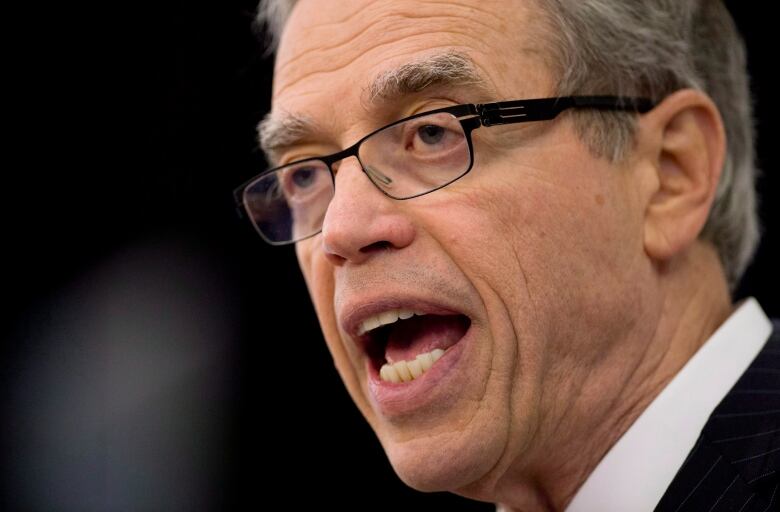Oil price falls below $70 US as OPEC leaves output unchanged
Canadian dollar plunges almost a full U.S. cent as cartel decides not to cut production
The Toronto stock market tumbled more than 100 points as energy stocks sold off and crude prices plunged to multiyear lows — below $70 US a barrel — after the OPEC cartel declined to cut oil production.
The S&P/TSX composite index dropped 115.97 points, 0.77 per cent, to 14,922.44. Trading volumes were lower than usual with American markets closed for the U.S. Thanksgiving holiday.
The energy sector lost seven per cent while the January crude contract was down $4.64 to a 4½ year low of $69.05 US a barrel.
Falling oil prices pushed the Canadian dollar down 0.75 of a cent to 88.25 cents US.
There had been hopes that oil ministers with the Organization of the Petroleum Exporting Countries who met in Vienna would cut production in order to put a floor under prices that have fallen about 30 per cent since mid-summer, when prices were elevated by geopolitical worries. Prices have steadily fallen since then because of a strengthening U.S. dollar, lower demand prospects and, particularly, a glut of oil.
- OPEC meeting could reveal fractures in cartel
- Questions about $75 oil hang over Alberta's latest fiscal update
- Sask. finances on track despite low oil prices, finance minister says
But OPEC decided Thursday to keep its production target at 30 million barrels a day, despite an oversupply of crude and plunging prices.
Major oil supplier Saudi Arabia had indicated before the meeting that it favoured the status quo. The Saudis are the top producers within the 12-nation organization and effectively decide the cartel's policy.
Some less well-off members had favoured a cut, to reduce supplies and push prices back up. But because of booming shale production in the U.S, that would not have made a sizable dent in supply.
- Oil is headed to $60 without OPEC intervention, experts say
- Newfoundland and Labrador announces freeze on spending, hiring
- Crude awakening in oil prices casting Canada billions
OPEC still accounts for a third of the world's oil production, but the 32 per cent fall in prices is straining the tenuous image of unity it strives to project.
Dirk Lever, managing director of equity research with the Calgary-based investing firm AltaCorp, said the decision was not a big surprise.

In Canada, he said, the impact could include difficulties getting pipelines approved when the perception is there's too much oil.
"Being awash in crude and it being at a low price it's hard or harder to get approval, so I think it will be an uphill battle," Lever said.
Governments deal with price drop
Finance Minister Joe Oliver says the federal government has already considered the dramatic slide in oil prices in its
fiscal forecasts.
"When we took into account the oil price decline which had already occurred, we made the assumption that the prices would stay at the low level for the entire period," Oliver told a media conference on Thursday.
Oliver said that's "a relatively conservative assumption and we'll continue to monitor the level of prices."
Lower oil prices are starting to bite into Canadian provinces' finances as well.
- In Newfoundland and Labrador, Premier Paul Davis has announced the government is imposing a freeze on discretionary spending and imposing an extra layer of approval on all hiring.
- In Saskatchewan, the spring budget was based on a price of oil that would average around $94 US per barrel, but the province says its finances are still on track thanks to higher potash revenue and Crown land sales.
- In Alberta, Finance Minister Robin Campbell has said "tough decisions" will need to be made if low prices persist. Revenue from Alberta's energy sector generally accounts for about 25 per cent of the province's total revenue.
Price war?
Tariq Zahir, analyst at Tyche Capital Advisors in New York, said the slide in U.S. crude could continue below $65 a
barrel in coming weeks, a factor that may start to challenge the economics of North American shale oil production.
"I really think we will start getting into a price war," Zahir said. "I think you would be a little crazy to try to pick
a bottom here. I expect to see a bounce but any bounce will be sold into."
He added trading volumes were reasonably strong on Thursday despite many U.S. traders being off for the Thanksgiving holiday.
Oil analysts said the OPEC decision left the oil market vulnerable to much bigger falls as abundant supply of high
quality, light crude oil floods world markets, much of it from shale oil in North America.
"Saudi Arabia and OPEC will have to live with a prolonged period of low prices for any dent in U.S.-shale or production
levels to happen," said Harry Tchilinguirian, senior strategist at BNP Paribas in London.
With files from Reuters and CBC News
